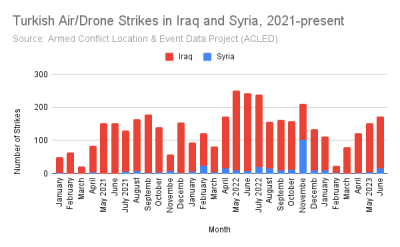
Turkey’s F-16s Wreak Havoc in Iraq and Syria. Here’s How Congress Can Stop Them.
For over a year, members of Congress have identified Turkish military actions in neighboring countries, including attacks on Syrian Kurdish forces, as obstacles to the potential sale of 40 new F-16 fighter jets to Turkey.
Following Turkish president Recep Tayyip Erdogan’s recent promise to forward Sweden’s NATO accession bid to parliament for ratification, the Biden administration has engaged with Congress to push key members to support the sale.
Senate Foreign Relations Committee Chairman Bob Menendez, who has the power to unilaterally block the sale, said that he had been in talks with the White House on the issue. On July 10, he claimed that there has been a “lull” in Turkey’s “aggression against its neighbors,” but that that the Biden administration needs to find a way to make that into a “permanent reality.” On July 19, Defense News reported that Menendez would not lift the hold on the basis of Sweden’s NATO accession alone.
Al-Monitor reported on July 12 that House Democrats see Erdogan’s NATO promises as “a significant step forward,” but “still have concerns about violations of Greek sovereignty, Turkish lack of enforcement of Russian sanctions and continued aggression against Kurdish partners.”
Congressional leaders are right to be hesitant. A NATO quid-pro-quo on F-16s may cause more trouble than it is worth. Turkey’s use of its existing fleet of F-16 fighter jets in Iraq and Syria has contributed to regional instability, created opportunities for ISIS, the Syrian regime, and Iran to strengthen their positions, and harmed countless civilians—with ethnic and religious minorities bearing the brunt of the violence. While Erdogan may have taken a more conciliatory view of Sweden’s NATO accession of late, he has not let up on these destructive patterns.
No ‘Lull’ in Turkish Aggression in Iraq and Syria
Since Erdogan and his ruling Justice and Development Party (AKP)’s victory in May 2023, Turkish military action against Kurdish groups Iraq and Syria has intensified.
Data from the Armed Conflict Location and Event Data Project (ACLED) shows that there have been 665 Turkish air strikes and drone strikes in northern Iraq and northern Syria in the first half of 2023.

June was the most violent month of 2023 yet. It saw the fifth highest number of Turkish strikes in Iraq and the fourth highest number of Turkish strikes in Syria of any month in the past two and a half years.
The low rate of strikes in February and March could be attributable to the impact of the Turkey-Syria earthquake and the PKK’s declaration of a ceasefire on Turkish territory. While the PKK’s decision did not apply to Syria or Iraq, and Turkey did not acknowledge it, these conditions may have reduced overall levels of violence.
Turkey Uses F-16s Against Counter-ISIS Forces
Turkey uses F-16s against the Syrian Democratic Forces (SDF) and their affiliated local administration, the Autonomous Administration of North and East Syria (AANES).
Turkey’s ability to take territory from the SDF—as it did in 2018’s Operation Olive Branch and 2019’s Operation Peace Spring—hinges on its ability to control airspace and launch air strikes that the SDF are unable to counter.
These military operations disrupted the fight against ISIS, strengthened the position of the Syrian government, Iran, and Russia in the region, and weakened the position of the U.S.-led Global Coalition. Turkish territorial control of Afrin and Ras al-Ain created safe havens for radical Islamist groups and destroyed moderate AANES governance in favor of militia rule extremely hostile to ethnic and religious minorities and women.
Air strikes against SDF-held territory outside of these ground operations have destabilized these regions and limited the ability of the SDF and AANES to effectively govern and provide security.
With Erdogan actively seeking rapprochement with Syria, it is possible to imagine a scenario in which Turkey uses its F-16s against the SDF for Assad’s benefit—or even in direct coordination with Damascus in attempts to retake Kurdish cities by force.
Turkey Uses F-16s Against Civilians and Civilian Infrastructure
Data from Airwars shows that between 790 and 1,251 civilians in Syria and Iraq have likely been killed in Turkish bombardment, including air strikes and artillery strikes, since 2015. Hundreds of thousands of civilians have been displaced by Turkish military actions.
Critical civilian infrastructure has also been targeted and destroyed. The November 2022 bombing of a power station outside of Derik, northeastern Syria, and the August 2021 attack on a medical facility in Iraq’s Sinjar are representative examples of Turkish actions.
Communities most affected by these strikes include persecuted ethnic and religious minorities. Many displaced Yezidi genocide survivors cite Turkish strikes against local leaders in the fight against ISIS as a reason why they fear returning to their homes in Sinjar. In Afrin, displacement caused by Turkish bombardment contributed to the ethnic cleansing of the region’s historic Kurdish, Yezidi, and Alevi populations.
As F-16s form the majority of Turkey’s fleet of combat aircraft, it is unquestionable that they have been used in many of these strikes—though drones are becoming more prominent in Turkey’s military campaigns in Iraq and Syria.
International human rights organizations have repeatedly documented instances of civilian harm in Turkey’s post-2015 military campaigns in Iraq and Syria.
- Amnesty International on Turkish strikes in Iraqi Kurdistan (2015): “Evidence collected by Amnesty International in a fact-finding mission indicates that multiple Turkish government airstrikes killed eight residents and injured at least eight others – including a child – in a flagrantly unlawful attack on the village of Zergele, in the Kandil Mountains in the Kurdistan Region of Iraq.”
- Human Rights Watch on Turkey’s Operation Olive Branch (2018): “Turkish Armed Forces appear to have failed to take necessary precautions to avoid civilian casualties in three attacks in northwest Syria in late January 2018…The attacks killed 26 civilians, including 17 children.”
- Human Rights Watch on Turkish strikes in Iraqi Kurdistan (2018): “Four apparent Turkish military operations against the armed Kurdistan Workers’ Party (PKK) in northern Iraq dating back over a year should be investigated for possible violations of the laws of war…The attacks killed at least seven non-combatants and wounded another, witnesses and relatives said…what appeared to be Turkish air and ground attacks during four operations between May 2017 and June 2018 killed at least six men and one woman and injured another man.”
- Amnesty International on Turkey’s Operation Peace Spring (2019): “The Turkish military offensive into northeast Syria has wreaked havoc on the lives of Syrian civilians who once again have been forced to flee their homes and are living in constant fear of indiscriminate bombardment, abductions and summary killings. Turkish military forces and their allies have displayed an utterly callous disregard for civilian lives, launching unlawful deadly attacks in residential areas that have killed and injured civilians.”
- Human Rights Watch on Turkey’s Operation Claw-Sword (2022): “Turkish airstrikes since November 20, 2022, are inflicting damage on densely populated areas and critical infrastructure across north and northeast Syria and exacerbating an already catastrophic humanitarian crisis for Kurds, Arabs, and other communities in the region.”
Policy Recommendations
Providing Turkey with new jets now would reward Erdogan for using his existing F-16 fleet to make the Middle East less secure. It would also further implicate Washington in the serious human rights violations Turkey has committed and will more than likely continue to commit using these jets.
Congress should not consider this sale absent 1) an end to all Turkish offensive action in Iraq and Syria (including air strikes and drone strikes) and 2) concrete evidence that Turkey has taken meaningful steps towards a political resolution to its Kurdish conflict. There is historical precedent for bipartisan Congressional support for peace in Turkey and efforts to condition arms and aid on an end to anti-Kurdish aggression.
The Biden administration should push Turkey to meet these conditions and offer them diplomatic and economic support in doing so. It should rescind its support for arms sales if these conditions are not met. This would align with its stated view that there is “no military solution” to Turkey’s Kurdish conflict and a need for Turkey to re-assess the efficacy of its cross-border operations in Syria and Iraq.
If Turkey cannot or will not end offensive actions in Iraq and Syria and take meaningful steps towards a political resolution to the Kurdish conflict, it should not receive any U.S. arms or security assistance that are likely to be used against civilians and/or counter-ISIS forces in cross-border operations.
(Photo by Orhan Akkanat/Anadolu Agency/Getty Images)


